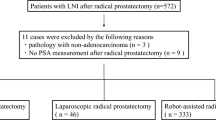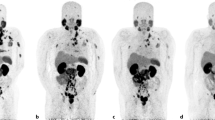Abstract
In patients with lymph node-positive and metastatic prostate cancer there is currently no consensus about the best possible management. Multimodal approaches including systemic and local treatment have shown to improve survival. However, the role of radical prostatectomy (RP) is currently unclear. While treatment of the primary tumor is recommended in highly selected lymph node-positive prostate cancer patients, no prospective data exist to support resection of the primary tumor in metastatic patients as a treatment modality to improve overall survival. However, recent observational studies have suggested a survival benefit after prostate tumor cytoreduction. This article reviews existing evidence on the role of RP in lymph node-positive and metastatic prostate cancer patients.

Similar content being viewed by others
References
Papers of particular interest, published recently, have been highlighted as: • Of importance •• Of major importance
Heidenreich A, Bastian PJ, Bellmunt J, Bolla M, Joniau S, van der Kwast T, et al. EAU guidelines on prostate cancer. Part II: treatment of advanced, relapsing, and castration-resistant prostate cancer. Eur Urol. 2014;65(2):467–79.
Wirth M, Tammela T, Cicalese V, Gomez Veiga F, Delaere K, Miller K, et al. Prevention of bone metastases in patients with high-risk nonmetastatic prostate cancer treated with zoledronic acid: efficacy and safety results of the zometa european study (zeus). Eur Urol Suppl. 2013.
Culp SH, Schellhammer PF, Williams MB. Might men diagnosed with metastatic prostate cancer benefit from definitive treatment of the primary tumor? A seer-based study. Eur Urol. 2013.
Frohmuller HG, Theiss M, Manseck A, Wirth MP. Survival and quality of life of patients with stage d1 (t1-3 pn1-2 m0) prostate cancer. Radical prostatectomy plus androgen deprivation versus androgen deprivation alone. Eur Urol. 1995;27(3):202–6. Largest series to report the effect of radical prostatectomy on lymph-node positive patients with PCa.
Mitin T, Blute M, Lee R, Efstathiou J. Management of lymph node-positive prostate cancer: the role of surgery and radiation therapy. Oncology (Williston Park, NY). 2013;27(7):647–55.
Engel J, Bastian PJ, Baur H, Beer V, Chaussy C, Gschwend JE, et al. Survival benefit of radical prostatectomy in lymph node-positive patients with prostate cancer. Eur Urol. 2010;57(5):754–61.
Spahn M. Is it time to change the treatment paradigm for lymph node-positive prostate cancer? Eur Urol. 2013.
Steuber T, Budaus L, Walz J, Zorn KC, Schlomm T, Chun F, et al. Radical prostatectomy improves progression-free and cancer-specific survival in men with lymph node positive prostate cancer in the prostate-specific antigen era: a confirmatory study. BJU Int. 2011;107(11):1755–61.
Boorjian SA, Thompson RH, Siddiqui S, Bagniewski S, Bergstralh EJ, Karnes RJ, et al. Long-term outcome after radical prostatectomy for patients with lymph node positive prostate cancer in the prostate specific antigen era. J Urol. 2007;178(3 Pt 1):864–70. discussion 870-861.
Bader P, Burkhard FC, Markwalder R, Studer UE. Disease progression and survival of patients with positive lymph nodes after radical prostatectomy. Is there a chance of cure? J Urol. 2003;169(3):849–54.
Briganti A, Karnes RJ, Da Pozzo LF, Cozzarini C, Capitanio U, Gallina A, et al. Combination of adjuvant hormonal and radiation therapy significantly prolongs survival of patients with pt2-4 pn+ prostate cancer: results of a matched analysis. Eur Urol. 2011;59(5):832–40.
Messing EM, Manola J, Yao J, Kiernan M, Crawford D, Wilding G, et al. Immediate versus deferred androgen deprivation treatment in patients with node-positive prostate cancer after radical prostatectomy and pelvic lymphadenectomy. Lancet Oncol. 2006;7(6):472–9.
Schiavina R, Borghesi M, Brunocilla E, Manferrari F, Fiorentino M, Vagnoni V, et al. Differing risk of cancer death among patients with lymph node metastasis after radical prostatectomy and pelvic lymph node dissection: identification of risk categories according to number of positive nodes and gleason score. BJU Int. 2013;111(8):1237–44.
Gakis G, Boorjian SA, Briganti A, Joniau S, Karazanashvili G, Karnes RJ, et al. The role of radical prostatectomy and lymph node dissection in lymph node-positive prostate cancer: a systematic review of the literature. Eur Urol. 2013.
Kennecke HF, Keyes M. Surgical management of node-positive prostate cancer: Perspectives from breast oncology. Eur Urol. 2013. Latest update on the management of lymph-node positive patients with breast cancer.
Lyman GH, Temin S, Edge SB, Newman LA, Turner RR, Weaver DL, et al. Sentinel lymph node biopsy for patients with early-stage breast cancer: American society of clinical oncology clinical practice guideline update. J Clin Oncol Off J Am Soc Clin Oncol. 2014.
Wu JN, Fish KM, Evans CP, Devere White RW, Dall’era MA. No improvement noted in overall or cause-specific survival for men presenting with metastatic prostate cancer over a 20-year period. Cancer. 2014;120(6):818–23.
Esquivel J, Sticca R, Sugarbaker P, Levine E, Yan TD, Alexander R, et al. Cytoreductive surgery and hyperthermic intraperitoneal chemotherapy in the management of peritoneal surface malignancies of colonic origin: a consensus statement. Society of surgical oncology. Ann Surg Oncol. 2007;14(1):128–33.
Crispen PL, Blute ML. Role of cytoreductive nephrectomy in the era of targeted therapy for renal cell carcinoma. Curr Urol Rep. 2012;13(1):38–46.
Polcher M, Zivanovic O, Chi DS. Cytoreductive surgery for advanced ovarian cancer. Women’s Health (Lond Engl). 2014;10(2):179–90.
Ost P, Briganti A, Giannarini G. Re: Stephen H. Culp, Paul F. Schellhammer, Michael B. Williams. Might men diagnosed with metastatic prostate cancer benefit from definitive treatment of the primary tumor? A seer-based study. Eur Urol. 2013. doi:10.1016/j.Eururo.2013.11.012.
Bayne CE. Re: Stephen H. Culp, Paul F. Schellhammer, Michael B. Williams. Might men diagnosed with metastatic prostate cancer benefit from definitive treatment of the primary tumor? A seer-based study. Eur Urol. 2014. doi:10.1016/j.Eururo.2013.11.012.
Chapin BF, McGuire SE, Aparicio A. Is treatment of the primary tumor in metastatic prostate cancer justified? Eur Urol. 2013.
Gratzke C, Engel J, Stief CG. Role of Radical Prostatectomy in Metastatic Prostate Cancer: Data from the Munich Cancer Registry. In Gratzke C, Engel J, Stief CG, editors. Eur Urol. 2014. doi:10.1016/j.eururo.2014.04.009.
Ceelen W, Pattyn P, Mareel M. Surgery, wound healing, and metastasis: recent insights and clinical implications. Crit Rev Oncol Hematol. 2014;89(1):16–26.
Shao YH, Kim S, Moore DF, Shih W, Lin Y, Stein M, et al. Cancer-specific survival after metastasis following primary radical prostatectomy compared with radiation therapy in prostate cancer patients: results of a population-based, propensity score-matched analysis. Eur Urol. 2014;65(4):693–700.
Compliance with Ethics Guidelines
Conflict of Interest
Dr. Christian Gratzke has received honoraria from AMS, Astellas, Pfizer, Lilly, Steba, Rottapharm Madaus, Recordati, MSD, and Bayer.
Dr. Jutta Engel and Dr. Christian G. Stief each declare no potential conflicts of interest.
Human and Animal Rights and Informed Consent
This article does not contain any studies with human or animal subjects performed by any of the authors.
Author information
Authors and Affiliations
Corresponding author
Additional information
This article is part of the Topical Collection on Urosurgery
Rights and permissions
About this article
Cite this article
Gratzke, C., Engel, J. & Stief, C.G. Role of Radical Prostatectomy in Clinically Non-Organ-Confined Prostate Cancer. Curr Urol Rep 15, 455 (2014). https://doi.org/10.1007/s11934-014-0455-9
Published:
DOI: https://doi.org/10.1007/s11934-014-0455-9




